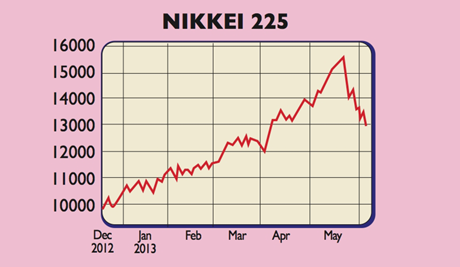
Japanese stocks fell on Wednesday as traders registered their disappointment with the reforms from prime minister Shinzo Abe. This is the “third arrow” of three in the economic strategy known as ‘Abenomics’. The package of reforms follows on from earlier moves to weaken the yen via quantitative easing (QE), and to help boost the Japanese economy through higher government spending. So far, ‘Abenomics’ has helped lift Japan’s benchmark Nikkei 225 share index by 53%, while pushing the yen lower against the dollar. But the market has slipped back by about 15% in recent weeks.
What the commentators said:
The latest package of reforms “centres on boosting incomes by 3% every year, a string of deregulation measures and boosting energy investments”, says Rebecca Clancy in The Daily Telegraph. After the success of Abenomics so far, investors had been optimistic about this “latest strategy to drive growth”, but that quickly turned to disappointment. One reason was that this type of structural reform “is more tricky and remains to be fleshed out later this month”. Moreover, investors’ hopes had been raised already, with “the main points already well-touted ahead of time”.
The Japanese market is still higher year-to-date, says David Keohane on FT Alphaville, “but the risks that Abe has really lost the market’s vote are mounting”. Traders are right to note “that the speech revealed little that was new and focused rather too much on long-term aspirations for most tastes”. Indeed, the pace of gains and losses in Japan’s volatile stockmarket this year “doesn’t really leave anybody any time to ponder the longer issues”. And for those with long memories, these arrows of economic reform may seem vaguely familiar, says Linda Sieg on Reuters. “Japan has a long history of crafting economic reform packages full of bold prescriptions and good intentions, many of which have ended up as empty promises.” The real test will come after the upper house election in July. Abe’s party needs “to win handily” if these proposals are ever to become legislation.
But while it’s true that “earlier exuberance was excessive”, says Julian Jessop of Capital Economics, there is “an increasing danger that the pendulum may now be swinging too far towards pessimism”. The success of ‘Abenomics’ is by no means guaranteed, but it “surely represents the right mix of policies to tackle Japan’s problems”.